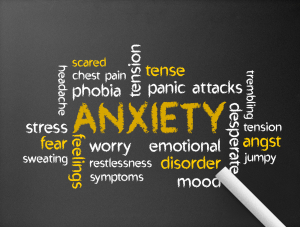Anxiety occurs when you have feelings of fear, apprehension, worry, nervousness or imminent danger, and reflects the thoughts and actions you have when involved in a situation that you feel you cannot manage safely or successfully. With mild anxiety, you might feel some fear or nervousness before undertaking something challenging such as an exam or job interview. A mild and infrequent level of anxiety can be healthy for you, as it prepares you to perform at your best during stressful situations. At these times, it is easily justified and considered normal. However, anxiety is considered a problem when you experience strong feelings of fear, worry and apprehension over a long period of time (such as weeks or months), and it prevents you from participating in or enjoying other parts of your life.
What is severe anxiety?
Severe anxiety is more intense than normal anxiety and may be felt even when you are not involved in any immediate stressful situations. Severe anxiety can be debilitating and greatly affect your ability to cope with normal situations in your daily life. You might experience physical symptoms including a racing heartbeat and nausea. You might also have persistent negative and unhelpful thoughts regarding your ability to cope with situations; debilitating feelings of distress; and consistently avoid uncomfortable situations which diminish your confidence and quality of life.
Severe anxiety may be caused by the following factors: environmental (stress from work, relationships, finances, school); medical (stress from a serious medical illness or the side effects of medication); substance use and abuse (intoxication and withdrawal); or genetics (a family history of anxiety). Anxiety disorders include Generalised Anxiety Disorder (GAD), Phobias, Panic Attacks, Social Anxiety, Agoraphobia, Obsessive-Compulsive Disorder (OCD).
Severe and long-term anxiety can lead to other problems in your life, including depression, relationship difficulties, and substance abuse. If you have strong feelings of anxiety that negatively impacts the way you feel and behave, you may have an anxiety disorder. If this occurs it is important that you seek help.
At Seed Psychology, our experienced Clinical Psychologists can assist you to learn new coping strategies to treat severe anxiety and anxiety disorders.
What are the symptoms of anxiety?
Emotional symptoms of anxiety include:
|
|
Common physical symptoms of anxiety include:
|
|
What can I do to manage anxiety?
Our Clinical Psychologists will help you learn new strategies to manage your anxiety, and gain insight into the causes and trigger factors for your anxiety. In addition to seeking psychological assistance, other steps you can take to manage your anxiety include:
Relaxation
Seek out ways to relax. This will alleviate and minimise your anxiety levels. You can undertake relaxation techniques at home, such as breathing exercises, meditation and walking. Additionally, you can participate in relaxation activities outside the home, such as yoga classes, sport and socialising with friends. You should try to take part in at least one pleasant activity each day.
Exercise, diet, and changing your routine
By eating healthy food, keeping a regular sleep pattern, and undertaking regular exercise, you will improve your overall mood, health and wellbeing. Reduce your caffeine and alcohol intake. You can make many lifestyle changes to decrease your anxiety. Identify what causes you stress and take action to address or confront these trigger factors.
Communicate your feelings to others
Talk to others about your thoughts and feelings, which can help you to decrease your anxiety, and receive outside support and assistance. By internalising your feelings of anxiety and not seeking help, you are likely to make yourself feel more distressed.
How do you treat anxiety disorders?
At Seed Psychology, anxiety issues and anxiety disorders are treated with evidence-based psychological therapies. The specific psychological treatment depends on the complexity and causes of the anxiety problem. At the very outset of treatment, our clinical psychologists will conduct an evaluation and identify the types of anxiety issues and disorders that you have experienced, as well as any other underlying concerns such as depression that might be present. Our psychologists will help you to identify potential factors that may be contributing to your anxiety, and will assist you to develop skills to effectively manage and minimise the symptoms of anxiety, and their impacts on your life. Treatments involve exploring and introducing healthy patterns of thinking and behaviour that can help to greatly reduce your symptoms of anxiety.






